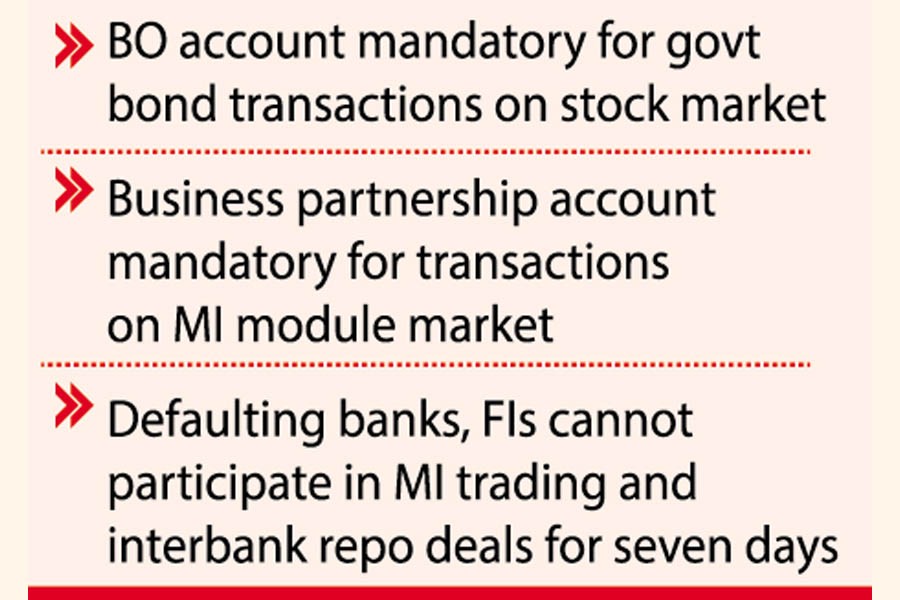Tips on trading in govt securities on secondary market
BB issues guidelines on trading in blue chips

Published :
Updated :

Binding rules are set for trading in secure government securities — coveted as blue chips — on the secondary market as part of measures for developing the capital market.
An investor who is willing to purchase the sovereign securities —- government bonds —- through stock exchange will require to have BO (Beneficiary Owner) accounts, according to the “guidelines on the secondary trading of government securities 2023 issued Tuesday by the Bangladesh Bank (BB).
If the investor intends to purchase the same from Bangladesh Bank-sponsored MI module, they will require another account similar to BO that is called BPID or Business Partner Identification.
All banks and FIs can participate in MI module transactions.
Currently there are two platforms of secondary trading in government securities, the BB-sponsored MI module launched in 2011 and the stock exchanges — Dhaka Stock Exchange (DSE) and Chittagong Stock Exchange (CSE).
The guidelines are meant mainly to more popularize the government securities on the secondary platforms. The secondary trading in the securities was debuted sometime in October 2022 on stock exchanges.
On default pertaining to investment in MI module, the investors will get remedies under the norms, rules and regulations of the BB.
If a member dealer, here a bank or other financial institution who maintains account with the central bank to deal in such securities, fails to deliver securities and/or makes payment within the settlement day, the defaulting party will try to settle the unsettled transaction by buy-in from the market or managing funds from the market within the transaction period.
“If bought-in securities or managing fund is not possible within the transaction period, penalty will be imposed on the defaulting parties.
“The defaulting party will not be allowed to participate in secondary trading and interbank repo activities for the next seven working days as a penalty,” says a binding rule of the dos.
In addition, the defaulting party will have to pay the other parties a penalty at a rate twice the weighted average overnight interbank repo rate+2.0 per cent on the total trade amount for one day.
The guidelines also state that if any member-dealer fails to pay interest, the central bank will have the right to adjust the amount from the current account maintained with the BB of the defaulting participants.
On default of stock exchanges, the BB will form a joint committee on dispute management comprising representatives from finance division, BB , BSEC, DSE, CSE, and CDBL (central depository of Bangladesh) to settle the common disputes among the parties.
The committee will report their observation/recommendation to both Bangladesh Bank and BSEC to do the needful at their end.
“The issues will be resolved upon recommendation from the committee and that decision made by the committee shall be final.”
In 2003, the central bank launched the Primary Dealer (PD) system, appointing eight banks and one financial institution as PDs for primary issuance and market development of government securities.
In 2011, the BB launched the Market Infrastructure (MI) module for automation of securities which serves as both a depository and a transaction platform.
jasimharoon@yahoo.com


 For all latest news, follow The Financial Express Google News channel.
For all latest news, follow The Financial Express Google News channel.